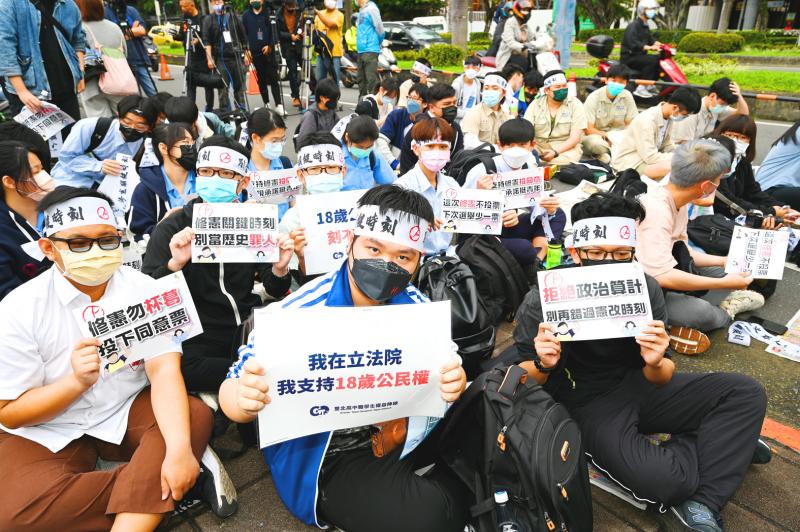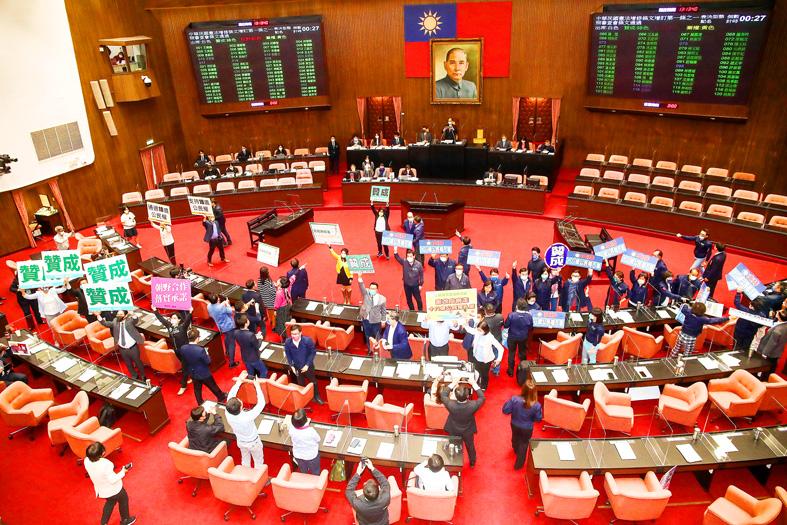Lawmakers across party lines yesterday voted to approve a constitutional amendment to lower the voting age from 20 to 18, clearing the amendment’s path to a referendum later this year.
The proposed bill was put to a vote on the legislative floor yesterday afternoon as dozens of high-school students and representatives of non-governmental organizations mobilized outside the Legislative Yuan building in Taipei to express their support for the amendment.
The final vote was 109-0, surpassing the minimum 82 “yes” votes required for the bill to clear the legislature.

Photo: Tien Yu-hua, Taipei Times
The result was a victory for student and civic groups, many of which have spent years trying to bring Taiwan’s voting age in line with most other democratic countries.
Constitutional amendments must first clear the legislature with the approval of at least three-quarters of lawmakers present at a meeting attended by a minimum of three-quarters of all lawmakers, according to the Additional Articles of the Constitution of the Republic of China (中華民國憲法增修條文).
Once an amendment is approved by the Legislative Yuan, it must be voted on in a national referendum. It passes if half of all eligible voters cast ballots in its favor.

Photo: CNA
Civil society groups had expressed hope that the bill would clear the legislature yesterday so it could be voted on in a referendum on the same day as local elections in November, as nationwide elections are more likely to attract a higher voter turnout.
The bill to grant Taiwanese aged 18 or older the right to vote was cosponsored by the Democratic Progressive Party (DPP), the Taiwan People’s Party and the New Power Party.
Previously, supporters of the amendment expressed concern that the bill might not pass the legislature because the Chinese Nationalist Party (KMT) had not committed itself to voting in favor of the amendment, although it had expressed support for lowering the voting age.
Based on the distribution of seats in the 113-seat legislature, where the DPP has 61 seats and the KMT has 39 seats, the bill could only clear the body with the support of both parties.

ACTION PLAN: Taiwan would expand procurement from the US and encourage more companies to invest in the US to deepen bilateral cooperation, Lai said The government would not impose reciprocal tariffs in retaliation against US levies, President William Lai (賴清德) said yesterday, as he announced five strategies to address the issue, including pledging to increase Taiwanese companies’ investments in the US. Lai has in the past few days met with administrative and national security officials, as well as representatives from various industries, to explore countermeasures after US President Donald Trump on Wednesday last week announced a 32 percent duty on Taiwanese imports. In a video released yesterday evening, Lai said that Taiwan would not retaliate against the US with higher tariffs and Taiwanese companies’ commitments to

Intelligence agents have recorded 510,000 instances of “controversial information” being spread online by the Chinese Communist Party (CCP) so far this year, the National Security Bureau (NSB) said in a report yesterday, as it warned of artificial intelligence (AI) being employed to generate destabilizing misinformation. The bureau submitted a written report to the Legislative Yuan in preparation for National Security Bureau Director-General Tsai Ming-yen’s (蔡明彥) appearance before the Foreign Affairs and National Defense Committee today. The CCP has been using cognitive warfare to divide Taiwanese society by commenting on controversial issues such as Taiwan Semiconductor Manufacturing Co’s (TSMC, 台積電) investments in the

‘SPECIAL CHANNEL’: Taipei’s most important tasks are to stabilize industries affected by Trump’s trade tariffs and keep negotiations with Washington open, a source said National Security Council Secretary-General Joseph Wu (吳釗燮) arrived in the US for talks with US President Donald Trump’s administration, a source familiar with the matter said on Friday. Wu was leading a delegation for a meeting known as the “special channel,” the Financial Times reported earlier. It marked Trump’s first use of the channel since returning to the White House on Jan. 20. Citing a source familiar with the matter, the Financial Times reported that Minister of Foreign Affairs Lin Chia-lung (林佳龍) was also a part of the delegation. The visit came days after China concluded war games around Taiwan and amid Trump’s

HELPING HAND: The steering committee of the National Stabilization Fund is expected to hold a meeting to discuss how and when to utilize the fund to help buffer the sell-off The TAIEX plunged 2,065.87 points, or 9.7 percent, to close at 19,232.35 yesterday, the highest single-day percentage loss on record, as investors braced for US President Donald Trump’s tariffs after an extended holiday weekend. Amid the pessimistic atmosphere, 945 listed companies led by large-cap stocks — including Taiwan Semiconductor Manufacturing Co (TSMC, 台積電), Hon Hai Precision Industry Co (鴻海精密) and Largan Precision Co (大立光) — fell by the daily maximum of 10 percent at the close, Taiwan Stock Exchange data showed. The number of listed companies ending limit-down set a new record, the exchange said. The TAIEX plunged by daily maxiumu in just